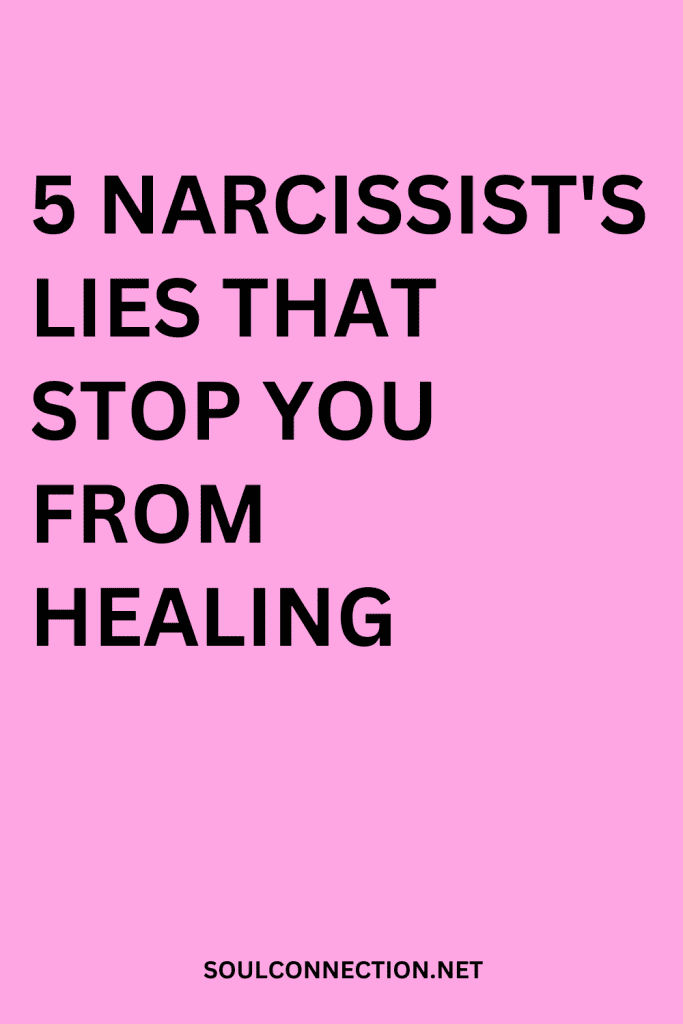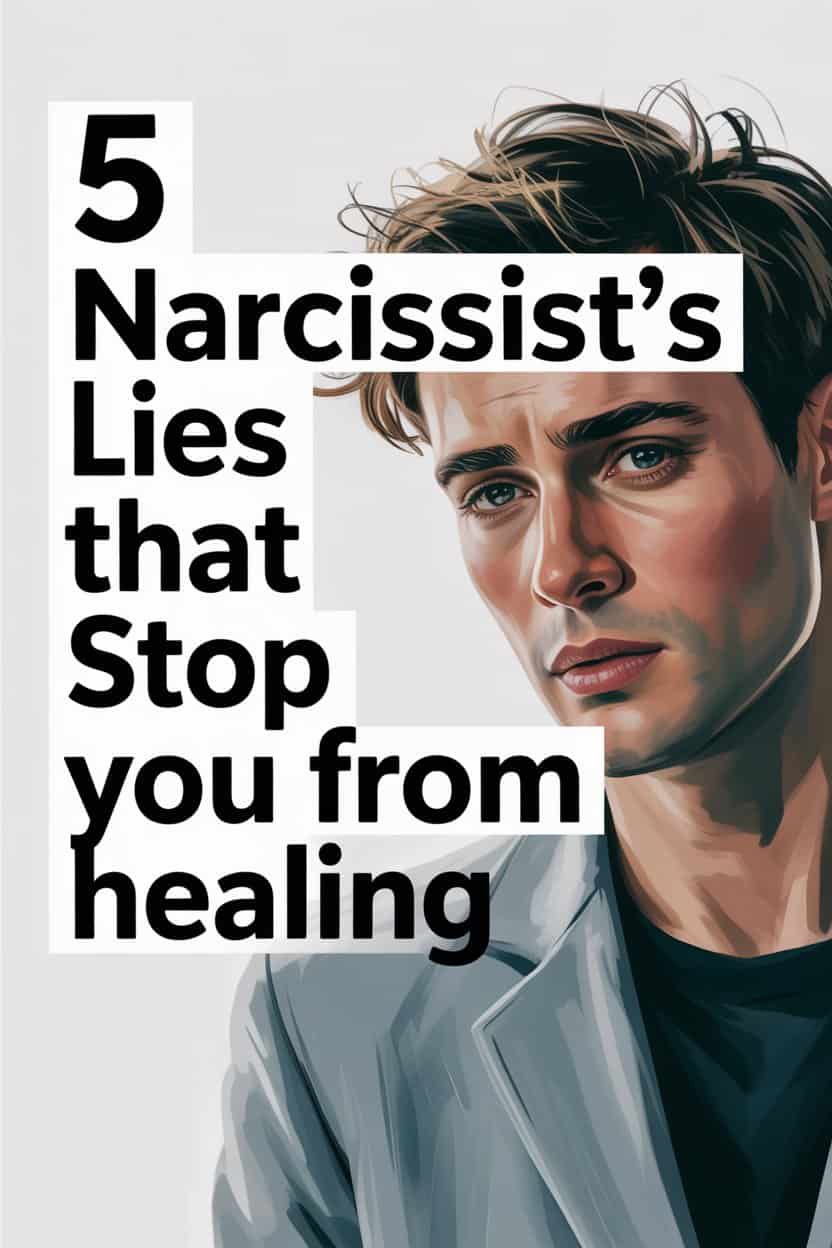Escaping a relationship with a narcissist can feel like crawling out of a magician’s box, only to realize the handcuffs are still on.
Just when you think you’ve caught your breath, their favorite party tricks—lies, gaslighting, and all-around reality distortion—linger in your head, slowing your healing to a crawl.
Here’s the catch: Narcissists don’t just mess with your life while you’re together. Their words have a sneaky way of echoing long after they’ve left the building.
Below, you’ll find five of their juiciest lies, why they stick, and how to finally tell them to sling their hook.
1. The Lie That Everything Was Your Fault
Narcissists hand out blame like free samples at Costco. Stubbed their toe? Clearly your shoes are in the wrong place. They ruined your birthday? Well, you shouldn’t have had expectations.
Over time, this blame game seeps into your bones. You start replaying scenarios, wondering what you could’ve done differently, and before you know it, their voice in your head starts sounding suspiciously like your own.
Unpacking this lie isn’t just about “thinking positive.” It means deliberately noticing when that blame soundtrack revs up, then pausing to question it. Is every broken dish or sideways glance actually your responsibility?
Spoiler: Not even close.
Try a reality check with a trusted friend or therapist. Often, just saying out loud, “Was it really my fault when they got angry because their phone charger was missing?” brings a fresh wave of clarity. (And maybe a laugh.)
Shaking off this particular lie is tough, because narcissists are masters at convincing you their mess is your mess. But with each small act of self-kindness—letting yourself off the hook when things go wrong—you loosen their grip a little more.
2. The Lie That You’re Too Sensitive
Classic move: You say, “That hurt my feelings.” They say, “You’re overreacting.” Or, “You’re too sensitive. No one else would be this upset.”
At first, you might try harder to grow thicker skin. But somewhere down the line, you start questioning your own reactions. Did it really hurt, or am I just dramatic? Should I just “get over it”?
Here’s the truth: Empathy and emotion aren’t character flaws. They’re the very things that keep us human—unlike, say, belittling people for sport.
Narcissists call you “too sensitive” because your feelings threaten the little empire they’ve built out of smoke and mirrors.
Instead of shrinking yourself, try leaning into your sensitivity. Notice what makes you feel uncomfortable. Trust that if something stings, it probably crossed a line.
Your feelings are not up for debate (unless you’re debating with yourself about whether you want dessert).
If you catch yourself dismissing your emotions or apologizing for being “too much,” pause. Flip the script: “My feelings are valid. I get to decide what hurts.” Sometimes just repeating that mantra in the mirror is a tiny act of rebellion.
3. The Lie That No One Else Would Love You
This one’s a classic, right up there with “the cheque’s in the mail.” Narcissists are forever hinting—or outright saying—that you’re lucky anyone puts up with you. “No one else would understand you. No one else could love you.”
They want you to feel as if they’re doing you a favor by sticking around—like a dodgy charity shop that only accepts slightly broken goods.
Hearing this enough times, you start to believe it. Looking in the mirror, you see flaws and quirks as proof that you’re unlovable.
But here’s a dose of reality: Narcissists say this because it suits them. They’re not relationship experts, and their opinion is about as reliable as a weather forecast in April.
The world is teeming with people who would actually appreciate you for the exact things a narcissist found “too much.”
Take small steps to rebuild your self-worth. Start by listing three things you like about yourself—yes, even if the only thing you can muster is “I make a mean cup of tea” or “I have excellent taste in socks.” (Both excellent foundations, by the way.)
Remind yourself that love isn’t about someone tolerating you or keeping score. It’s about being seen—and loved—for who you are.
4. The Lie That You’re Impossible to Please
Narcissists love painting you as the world’s fussiest customer. If you ask for basic kindness? “Nothing’s ever good enough for you.” Wanting respect? “You’re too demanding.”
Eventually, your standards start shrinking. You catch yourself accepting crumbs and feeling guilty for wanting a whole slice of cake, metaphorically (or literally, let’s be honest).
The truth: Wanting respectful, loving treatment isn’t asking for the moon. It’s the bare minimum. Narcissists push this lie because—shocker—they don’t want to put in the effort.
If you believe you’re unreasonable, they can keep coasting along at “barely trying” and call it a relationship.
It helps to check in with friends or people you trust. When you describe what you wanted—“I just wanted them to remember my birthday,” “I asked them to stop yelling”—see if anyone gasps in horror at your outrageous demands.
Odds are, they’ll say, “That’s normal,” while you realize how low the bar has dropped.
Start re-learning your own standards. Write down what you actually want in a relationship, even if it feels audacious.
The list might include things you haven’t had in ages: kindness, honesty, actual listening. These aren’t luxury items—they’re the basics.
5. The Lie That You’re Just as Bad as Them
Here’s the narcissist’s pièce de résistance: “Everyone’s a little toxic,” or, “Well, you yelled that one time, so you’re just as bad as me.” It’s a perfect way to muddy the waters and keep you on their level.
Before you know it, you’re cataloguing every time you lost your temper—never mind that your outburst was after months of silent treatment and gaslighting.
Owning your mistakes is healthy. Being held hostage by them is not. There’s a difference between being human and being harmful.
The narcissist’s favorite trick is to erase that line, so you feel like you have no right to heal or move on.
Time for a reality check: Did your actions come from pain or a genuine desire to hurt? Did you apologize when you messed up, or brush it off? Healthy people slip up, but they also try to do better.
Narcissists, on the other hand, rarely reflect unless there’s something in it for them.
Self-forgiveness is a muscle, and right now, it might be a bit flabby. Start by acknowledging: “I wasn’t perfect, but I was never cruel.” Hold onto that. Healing doesn’t require sainthood—just willingness to keep growing.
Reclaiming Your Story
Believing these lies is like wearing someone else’s glasses: nothing looks right, and your headache just gets worse. Narcissists are experts at spinning stories that keep you stuck, but those stories aren’t the truth.
They’re just noise that drowns out your own voice.
Healing starts the moment you call out these lies—sometimes with a snort, sometimes with a shout. With every step you take back toward yourself, the narcissist’s grip fades a little more.
Your job isn’t to convince them you’re worthy or reasonable or lovable. It’s to remind yourself—loudly, if you have to—that the only opinion that really matters now is your own.
And if you ever need backup, just picture your future self: sipping coffee, laughing at how you once believed a narcissist could predict who’d love you next.
(Hint: it’s a pretty long list.)


